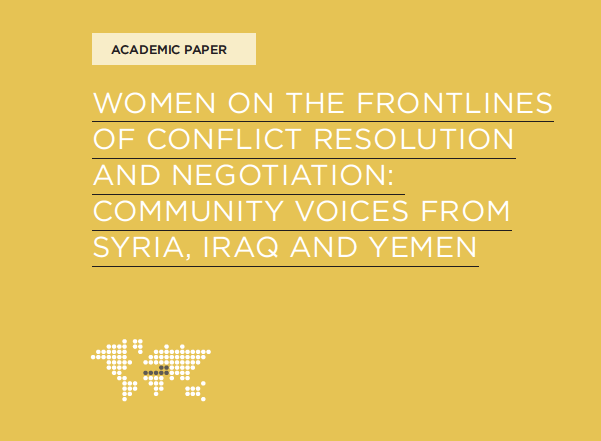Yemeni women using tribal systems to resolve conflict
Date:

Yemen has been locked in a devastating conflict that has killed or injured almost 60,000 people and displaced 3 million more. Yemeni civilians are facing a dire humanitarian situation compounded by a severe cholera outbreak.
The situation of Yemeni women is exacerbated by gender dynamics and gender-based violence. Yet despite grave risks, Yemeni women are playing an active role in supporting peace and stability within their communities by building upon a strong tradition of female leadership in the country. This includes women in tribal areas who have long been critical to resolving conflict within and between tribes.
Although tribal social systems are patriarchal in nature, many women in these communities have social status allowing them to play a role in dispute resolution through lobbying male family members at home or in private. Limited but powerful evidence from Ibb and Shabwa Governorates shows the contributions that women are making to local security through tribal channels. In doing so, they are also demonstrating an understanding of meaningful engagement of women in mediating, negotiating and arbitrating disputes. Two such women are Sabreen[1] and Kawthar[2] who are pushing and re-shaping boundaries around notions of female leadership.
An educator and civil society leader in Yemen’s Shabwa Governorate, Sabreen views her engagement in local mediation as a natural extension of her work in the area’s public schools. Having spent years settling disputes between students, families and colleagues, Sabreen slowly became involved in larger and more complex cases. Following intensive training, she shifted her focus to tribal mediation to address instability and resolve conflict. This was put to good use when an armed group appeared in her community. Fearing that their presence might lead to armed confrontations with other groups, Sabreen initiated a dialogue between local men to equip them with arguments to convince the armed group of the neutrality of the civilians in the area. Her ‘behind-the-scene’ efforts resulted in an agreement with armed groups to leave key infrastructural assets under civilian control.
“When women display knowledge of local traditions and customs, they can break social barriers and win over community leaders and elders. This is essential for their efforts to resolve conflicts,” said Sabreen.
Kawthar is a legal activist and journalist. She works with a team of lawyers, politicians and tribal leaders to address the severe backlog of prisoners awaiting sentencing or trial by identifying cases that could be transferred to tribal channels for mediation. Among the many cases Kawthar was assigned to, there was a murder case that resulted in dispute between two villages inching towards violent conflict. To diffuse tensions exacerbated by the prisoner’s looming execution, Kawthar and her colleagues successfully engaged tribal leaders in both areas to undertake a customary ‘sulh’ or reconciliation; a multi-staged mediation process to repair relations between parties.
“It is these different efforts and the constant putting out of fires that kept the governance from being pulled into the fighting.” Kawthar said. “Women are central here, we are constantly extinguishing fires.”
While Sabreen was working somewhat behind the scenes, Kawthar and her female colleagues worked directly alongside local male leaders, something she recalls as “the first of its kind.” Sabreen and Kawthar’s experiences in tribal dispute resolution offer noticeably different versions of women’s participation in resolving conflict at the local level. Yet, they both demonstrate women’s leadership in shoring up the stability of Yemeni communities. This is neither rare nor isolated. On the contrary, women throughout Yemen are taking on essential roles to bring about peace and stability in the face of the country’s complex conflict and its dire humanitarian fallout.
[1] Name changed to protect identify
[2] Name changed to protect identity
Read more about how other women in the region are helping resolve conflict in their communities.